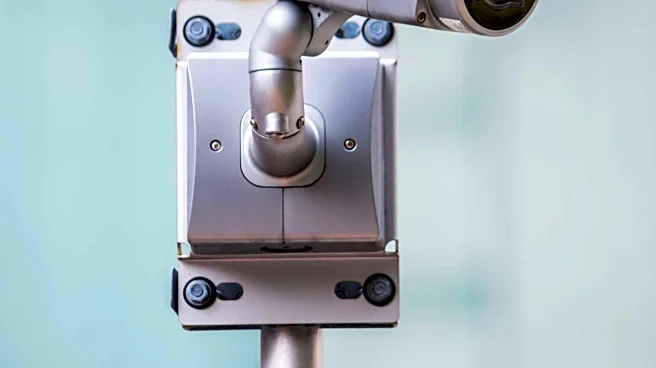What's Happening?
A collaborative study between Nigerian and Japanese researchers has successfully validated the Smart Eye Camera (SEC) as a teleophthalmology device aimed at reducing preventable and treatable blindness
in Nigeria. The study, led by Professor Emmanuel Oluwadare Balogun from Ahmadu Bello University, involved experts from various institutions, including ECWA Eye Hospital, Kano, and Keio University School of Medicine, Tokyo. The SEC, developed by OUI Inc., Japan, is a smartphone-mounted device that offers a cost-effective and portable alternative to traditional slit-lamp microscopes. It enables detailed eye examinations and has shown a diagnostic accuracy of up to 96%, comparable to conventional methods. The device is particularly beneficial for rural and remote areas with limited access to ophthalmologists.
Why It's Important?
The validation of the Smart Eye Camera represents a significant advancement in eye healthcare, particularly in low-resource settings like Nigeria. With an estimated 1.13 million people blind in Nigeria, the SEC offers a more affordable solution, costing approximately N1.7 million compared to N13 million for traditional equipment. Its portability and ease of use make it ideal for remote areas, potentially bridging the gap in healthcare accessibility. The device's real-time telemedicine capabilities allow for immediate diagnosis and treatment, which is crucial in underserved regions. This innovation could significantly reduce the prevalence of blindness, not only in Nigeria but also in other low- and middle-income countries.
What's Next?
The successful validation of the SEC paves the way for its broader implementation across Nigeria and potentially other countries facing similar healthcare challenges. The study's findings could encourage healthcare policymakers and organizations to invest in such cost-effective technologies. Further research and development may focus on enhancing the device's capabilities and expanding its use to diagnose a wider range of eye conditions. The integration of the SEC into national healthcare systems could lead to improved eye care services and outcomes, particularly in rural and underserved communities.
Beyond the Headlines
The introduction of the Smart Eye Camera could have broader implications for healthcare delivery in low-resource settings. By leveraging technology, countries can overcome barriers to accessing quality healthcare, thus improving overall public health outcomes. The SEC's success may inspire similar innovations in other medical fields, promoting a shift towards more accessible and affordable healthcare solutions globally. Additionally, the study highlights the importance of international collaboration in addressing global health challenges, setting a precedent for future partnerships.









